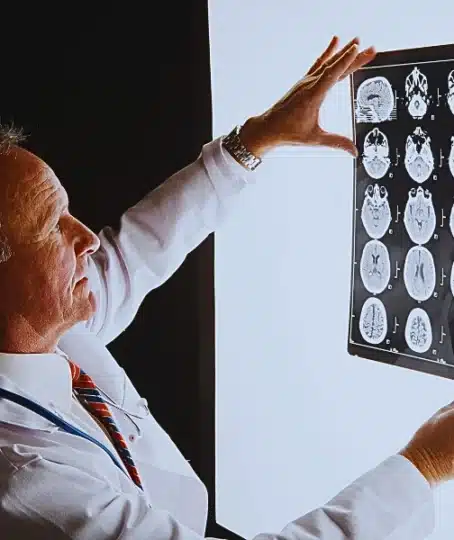
A construction worker was injured in a Peoria County construction zone after a delivery van crossed into a closed lane...


When it comes to concussions in the workplace, mild doesn’t always mean minor. Even a small bump to the head can lead to serious injury or death if you get hit just right. Mild concussions can still lead to many serious side effects that can affect cognitive behavior and safety. In many cases, injuries from mild concussions can be invisible until complications arise. By then, treatment and recovery can be more difficult. Because of this, it is important to get checked out by a medical professional if you suffered a head injury in the workplace, regardless of how serious you think it may be.
If you suffered a head injury at work, it’s time to talk to a work injury lawyer for assistance with your case. At Strong Law Offices, we work hard to protect your rights, keep you informed, and help you recover. Our attorneys are available 24/7 to offer legal advice and guidance after an injury. Contact our Peoria law offices today at 309-393-2928.

Head injuries are no joke. A workplace head injury labeled as "mild" can be dangerously misleading. Even minor concussions sustained on the job can result in significant health consequences that affect your cognitive function, emotional well-being, and ability to work safely.
Workplace concussions can cause a range of debilitating symptoms, including:
One of the most concerning aspects of workplace concussions is that symptoms don't always appear immediately after the injury. Many injured workers feel pressure to return to their duties before symptoms fully develop. Without immediate signs of injury, employees may continue working, unknowingly worsening their condition. This premature return to work can result in long-term or even permanent brain damage that could have been prevented with proper medical evaluation and rest.
Medical research shows that concussion symptoms often intensify in the hours and days following a head injury. Three key factors explain this dangerous progression:
Given these delayed and progressive symptoms, seeking immediate medical attention after any workplace head injury is essential. A healthcare professional can properly assess your injury, establish a baseline for your condition, and provide guidance on safe recovery protocols.
Skipping this critical step puts you at risk for second-impact syndrome, prolonged recovery times, and permanent neurological damage. When it comes to workplace head injuries, the safest approach is to get checked out by a medical professional. Your long-term brain health depends on it.
If you sustained a concussion while performing job-related duties, you're entitled to workers' compensation benefits regardless of who was at fault for the accident. Almost every employer in Illinois is required to carry workers’ compensation insurance to cover injuries like this, with limited exceptions for independent contractors, some farmworkers, and sole proprietors. Employers who knowingly and willfully fail to provide workers’ compensation insurance can face substantial penalties, and in some cases, can be held directly liable for injuries on the workplace.
The following benefits are available to individuals suffering from concussions in the workplace:
Workers’ comp in Illinois is not fault based. Even if the concussion was your fault, you can still receive compensation for your injury through workers’ compensation benefits.
It is not recommended that you go right back to work with a mild concussion, even if you feel fine. Working after a head injury can worsen the effects of your injury and make recovery more difficult for you down the road. Additionally, returning to work after a concussion can lead others, including the insurance adjusters, to believe your condition is not as bad as you say it is, which may reduce the compensation you receive.
Mild concussions frequently go unreported because a mild concussion can often seem like no big deal, especially when symptoms do not manifest right away. This mindset is dangerous. Any head injury has the potential to become serious without proper medical monitoring and care. What begins as a seemingly minor bump can escalate into a debilitating condition if left untreated. Never assume a head injury is too minor for medical evaluation.
The best way to determine whether you have a concussion is to get evaluated by a medical professional. Only a professional can accurately diagnose you with a concussion and determine how serious your injuries are. While you may experience obvious symptoms like headaches or confusion, many concussion symptoms are subtle or delayed. Self-diagnosis is unreliable and potentially dangerous.
A healthcare provider will conduct appropriate neurological assessments, may order diagnostic imaging if necessary, and can establish a treatment plan tailored to your specific injury. Without professional medical evaluation, you risk missing critical symptoms or failing to receive necessary treatment that could prevent long-term complications.
If your workers’ compensation claim has been delayed, denied, or undervalued, an experienced workplace injury attorney can make the difference in securing the benefits you deserve. A skilled lawyer will help you:
At Strong Law Offices, we fight for injured workers. With more than 25 years of experience, our attorneys offer 24/7 availability, free consultations, and no fees unless we win your case. We proudly represent the working people of Illinois, helping employees and their families rebuild after serious injuries like workplace concussions.
Contact our Peoria work injury lawyers today at 309-393-2928.

A construction worker was injured in a Peoria County construction zone after a delivery van crossed into a closed lane...

Your Duty to Report a Work Injury in Illinois Under the Illinois Workers’ Compensation Act, injured employees must notify their...

What Factors Determine Your Average Weekly Wage in Illinois Workers’ Compensation? Besides covering your medical bills, workers’ comp gives you...